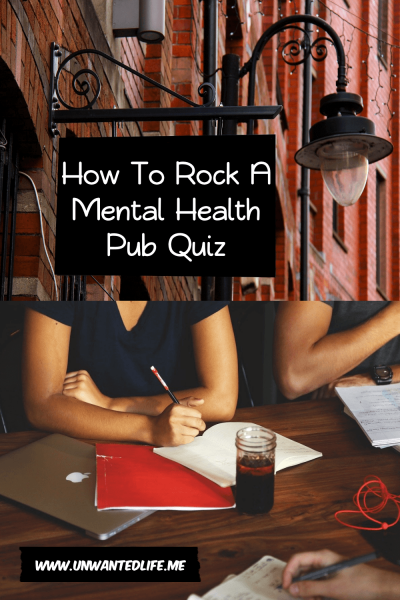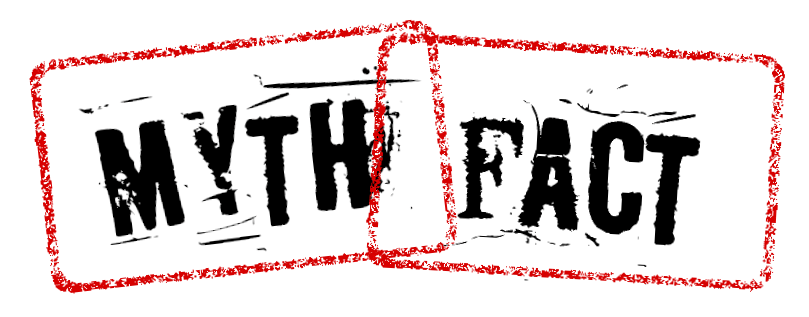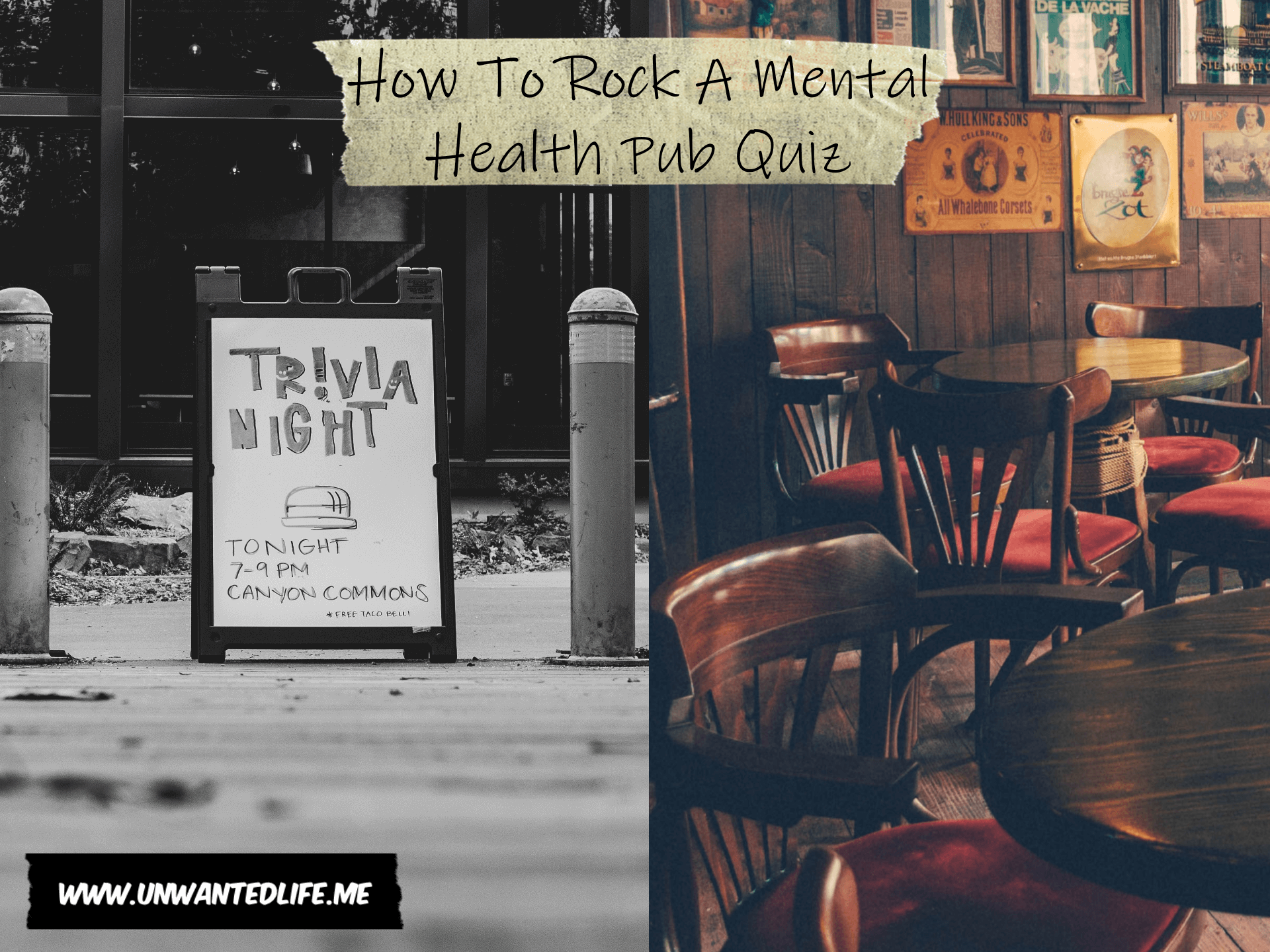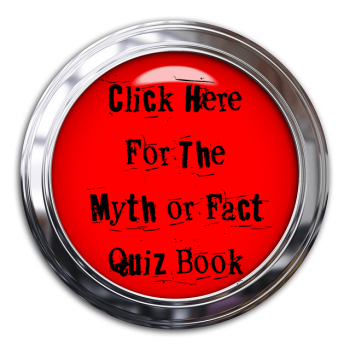This pub quiz idea was inspired by Time To Change, which I want to give them credit for as they close their operation down due to funding. They were a great resource for helping workers look after their mental health, and I’m trying to adapt as much of their stuff as I can to keep the momentum they started going.
I’ve created two potential pub quizzes that you could do with other people, which will also be available as PDF downloadable in this article. So don’t forget to grab your own copy. If you want to test yourself, why not try answering the question as you read through the article and let me know the results in the comments section at the end.
Traditional Style Mental Health Pub Quiz
Questions
Q1
According to the Mental Health Foundation, what percentage of adults have found themselves unable to cope with the stress caused by their appearance and body image?
a. 5%.
b.15%.
c. 30%.
d. 50%.
Q2
What percentage of males have a binge eating disorder, according to Eating Disorder Hope?
a. 10%.
b. 20%.
c. 30%.
d. 40%.
Q3
The NHS and Time to Change both estimate how many people in the UK will experience a mental health issue each year.
Alternatively, for my American readers.
The Mental Health Disorder Statistics provided by Johns Hopkins Medicine estimate how many people in the US will experience a mental health issue each year?
a. 1 in 10.
b. 1 in 8.
c. 1 in 6.
d. 1 in 4.
Q4
What is the global percentage of people with a mental health condition, according to Our World in Data?
a. 10.7%.
b. 7.5%.
c. 3.3%.
d. 1.1%.
Q5
According to the WHO, how many people are estimated to die due to suicide each year globally?
a. 1,000,000.
b. 800,000.
c. 500,000.
d. 225,000.
Q6
Rank these in order of the most common form of mental illness.
Schizophrenia
Anxiety
Depression
Bipolar
Q7
Which of these is a common symptom of schizophrenia?
a. Hallucinations & delusions.
b. Violent behaviour.
c. Split personality.
d. Rapid heartbeat.
Q8
Which statement about OCD is the most accurate?
a. Everyone is a little bit OCD.
b. People with OCD experience frequent intrusive and unwelcome obsessional thoughts, often followed by repetitive compulsions or impulses.
c. People with OCD have frequent intrusive thoughts.
d. People with OCD just like things to be clean and tidy.
Q9
True or false, people with a mental health condition are more likely to commit a crime?
Q10
What is the global estimate of substance abuse according to Our World in Data?
a. 113 million people.
b. 138 million people.
c. 152 million people.
d. 164 million people.

Q11
Which of these famous historical figures experienced mental health problems?
a. Abraham Lincoln.
b. Winston Churchill.
c. Florence Nightingale.
d. Charles Dickens.
Q12
According to the World Health Organisation, how much does mental health cost the global economy?
a. $1 billion.
b. $10 billion.
c. $100 billion.
d. $1 trillion.
Q13
Which country’s Prime Minister was re-elected in 2001 after publicly taking time off for depression?
a. Poland.
b. Norway.
c. Mexico.
d. United Kingdom.
Q14
What percentage of countries don’t have any mental health legislation according to the World Health Organisation?
a. 2%.
b. 10%.
c. 17%.
d. 25%.
Q15
According to the World Bank, what percentage of the global child and adolescent population suffers from mental, neurological, or substance use disorders?
a. 20%.
b. 15%.
c. 10%.
d. 5%.
Q16
Which of the following ISN’T a personality disorder?
a. Depressed.
b. Paranoid.
c. Schizoid.
d. Histrionic.
Answers
Q1: c. 30%.
Q2: d. 40%.
Q3: d. 1 in 4.
Q4: a. 10.7%.
Q5: b. 800,000.
Q6: Correct order: Anxiety with 284m, Depression with 264m, Bipolar with 46m, and Schizophrenia with 20m, according to Our World in Data.
Q7: a. Hallucinations & delusions.
Q8: b. People with OCD experience frequent intrusive and unwelcome obsessional thoughts, often followed by repetitive compulsions or impulses.
Q9: False. People with mental health conditions are more likely to be a victim of crime than to be a perpetrator.
Q10: d. 164 million people.
Q11: a. b. c. and d. Each of these people experienced some sort of mental illness. Abraham Lincoln experienced depression according to friends and colleagues, in which they described his “melancholy” and “blue spells”. Churchill described his depression as described as being his “black dog”. Experts believe that Florence Nightingale had bipolar disorder, and Charles Dickens would fall into a period of depression when he started a new book, which would lift as the work progressed.
Q12: d. $1 trillion.
Q13: b. Norwegian Prime Minister Kjell Magne Bondevik announced in 1998 that he was experiencing a depressive episode, and took three weeks of sick leave before returning to office. Bondevik said he received thousands of supportive letters.
Q14: d. 25%.
Q15: a. 20%.
Q16: a. Depressed.
To download the quizzes and answer sheets, just click on one of the buttons for the UK or the US. Sorry, I couldn’t do one for each country.
Myth Or Fact: Pub Quiz
Give each team a card that says Myth and Fact and instruct them to put the rest of the cards you’ll give them either in the Myth or Fact pile. You’ll then go through the answers at the end.
Statements
People can’t work if they have a mental illness
Poor mental health increases the risk of developing long-lasting (chronic) physical health conditions
People with mental health illnesses are usually violent and unpredictable
Personality weakness or character flaws cause mental health problems
It’s easy for young people to talk to friends about their feelings
People with mental health problems can snap out of it if they try hard enough
Mental illness is very common
You should be able to get through mental health problems on your own
The stigma and discrimination around a mental illness can be worse than the condition itself
Self-harming isn’t a mental illness
3 in 4 mental illnesses start before you turn 24
Only military personnel and veterans suffer from PTSD

Answers
| Myth | Fact |
| People can’t work if they have a mental illness 1 in 4 people is affected by mental health issues, many of which are successful business leaders, politicians, and sports stars. | Poor mental health increases the risk of developing long-lasting (chronic) physical health conditions According to the CDC, poor mental health increases the risk of developing a physical health condition like heart disease, stroke, and/or cancer. |
| People with mental health illnesses are usually violent and unpredictable People with a mental illness are more likely to be a victim of violence than to be a perpetrator of it. | Mental illness is very common Globally, 10.7% of the population has a mental illness, according to the World Health Organisation. |
| Personality weakness or character flaws cause mental health problems Anyone can develop a mental health problem, with many factors from genes, injury, and family history all being at play. | The stigma and discrimination around a mental illness can be worse than the condition itself In a recent survey, 58% of people reported that stigma and discrimination is equally as damaging or harder to deal with than the condition itself. 87% also stated they’d experienced discrimination due to mental health problems. |
| It’s easy for young people to talk to friends about their feelings Young people experience and fear discrimination just like adults do, with nearly three in four young people fear the reactions of friends when they talk about their mental health problems. | Self-harming isn’t a mental illness Self-harm isn’t a mental illness but it is a symptom of a mental distress. |
| People with mental health problems can snap out of it if they try hard enough This simply isn’t true, and please don’t say this to someone who’s experiencing issues with their mental health. People experiencing mental health can recover, but it often takes time. | 3 in 4 mental illnesses start before you turn 24 According to the CDC, half of all mental illness occurs before someone turns 14, with three-quarters of mental illness beginning before the age of 24. The Annual Report of the Chief Medical Officer 2012 for the UK supports this, finding that 75% of mental illnesses start before a child reaches their 18th birthday. |
| You should be able to get through mental health problems on your own While it is possible to get through mental health problems on your own, not everyone can, and nor should you have to. There is nothing wrong with seeking support. | |
| Only military personnel and veterans suffer from PTSD Anyone can suffer from PTSD, as people develop it as a response to trauma they’ve experienced, such as crime and childbirth. |
Click here to download a copy of the Myth or Fact pub quiz book. Just cut along the lines to turn them into cards.
As always, leave your feedback in the comments section below. Also, feel free to share your experiences with mental health pub quizzes and pub quizzes in general in the comments section below as well. If you want to stay up-to-date with my blog, then sign up for my newsletter below. Alternatively, get push notifications for new articles by clicking the red bell icon in the bottom right corner.
Lastly, if you’d like to support my blog, then you can make a donation of any size below as well. Until next time, Unwanted Life readers.




Insightful – I love reading and learning more about mental health. I’m glad there are writers like you to educate me on it!
Thank you. I hope you enjoyed doing the quiz
This is a fun and engaging way to educate people. Thanks!
Thank you ☺️
This is great!!! It’s perfect for work and school environment as a way to educate many people in a fun way about mental health. It’s really a great tool. Thank so much for sharing this!
Thanks for checking it out
Wow, we didn’t know a lot of this stuff. Thanks for providing a myth vs fact section at the end.
That’s what makes the quizzes so useful, people have an easy and fun way to learn
This was an awesome blossom quiz! I am sure those who attempt these questions, will be more aware by the end of this article!
Hopefully people will also be inspired to do such quizzes at work when the next mental health day rolls around
I enjoyed having my go at the quiz and then learning by the right answers at the bottom. I also love your myth and fact table! I love that it is printable and easy to turn into cards. Educational games are my favorite. 🙂
You’ll have to let me know how well you did in both the quizzes
What a cool way to share knowledge on learning more about mental health. This is absolutely genius!
Rosie
https://www.loverosiee.co.uk
Thank you ?
This is a different take on a pub quiz- and I love that! I’ll have to try this one, thank you for sharing x
I hope you enjoy it
These are great resources that could be easily shared with friends or coworkers — I love how accessible you made them with the downloads!
Thank you ☺️
It’s both great and sad to see the statistics about mental health risks and population. Thank you for bringing awareness to us.
Indeed, there’s lots of room for improvement in mental health care and support
I genuinely love this idea. People always compete on their knowledge, yet when it comes to mental health, a lot of people are shockingly ignorant and uneducated. Doing a quiz like this not only helps raising awareness but also improves knowledge on this important issue. Well done 🙂
Thank you. The quizzes should make for great yet simple mental health ice breakers at work or in education
Great Post! Some answers I knew, and some I didn’t. There is huge stigma related with mental illness. I follow a blog, and she too blogging about her own struggles with mental illness, admits that stigma is attached, once you opened up about it, or on medications etc. There is another guy who too is furious about people attitude towards mental illness. He wrote a book about his own mental illness, and wanted to raise charity, and unable to, because people are not cooperating. Blogs like yours as well others are making a lot of difference in telling them, as well as and the rest of the world that they are not alone.
There’s a lot of work to be done to tackle mental health stigma
This is such a great way to bring awareness about a topic that is usually ignored by many. Thank you for doing this!
Thank you
Thanks for raising this important topic in a very unique way
Thanks for reading
Great quizzes! I didn’t know Florence Nightingale may have been bipolar. (although that was a trick question!) I learned a lot, thanks!
You’ve got to have a trick question in a quiz
Very insightful post. Myth and facts you shared are real eye openers.
Thank you
Very interesting, love learning something new with each of your posts. Thanks for sharing!
Olivia | https://www.oliviaandbeauty.com/
Glad to be of use in helping your learn something new
Thank you for sharing this quiz. There is so much that we think we know about mental health, but this just proves that there is still much more we need to learn. Thank you for bring awareness.
xo Erica
Thanks for reading
awesome post! It’s so important to be able to talk openly about mental health!
Indeed it is important
This was very insightful. I learned a lot from the quiz!
I’m glad you learned something
I’ve heard of pub trivia nights before, but never one with a mental health quiz. What a great idea! It’s such an important topic and this is a great way to generate conversation. I definitely learned some new things from the quizzes too!
Often the best way to get a conversation going are easy to do activities
What a great way to raise mental awareness. The statistics of the quiz are beyond startlingly. Mental health is so important all the time (not just during a pandemic). Your blog always has such insightful ideas about coping (and helping our loved ones cope). Thank you for your bravery to share your stores, resources and ideas to bring awareness to others.
Thank you very much ?
This is such a great way to educate people! I love learning about mental health. Also, I just saw your blog for the first time and I love it. ?
Thank you for your very kind words